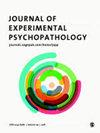A review of experimental research on anxiety and sexual arousal: Implications for the treatment of sexual dysfunction using cognitive behavioral therapy
IF 1.9
4区 医学
Q4 PSYCHIATRY
引用次数: 23
Abstract
Clinical models of sexual response link anxiety to the etiology of sexual dysfunction. Furthermore, some cognitive behavioral therapies (CBTs) for sexual dysfunction have included strategies targeting anxiety reduction. This review examines the experimental literature on the effects of manipulating aspects of the anxiety response (e.g., anxious sensations, thoughts, attentional focus) on genital and self-reported sexual arousal. An additional aim was to use this literature to elucidate potential mechanisms that may be useful for CBT for sexual dysfunction. Our review suggested that anxiety sometimes facilitates, inhibits, or has no effect on sexual arousal. These findings suggest that caution is warranted incorporating anxiety-focused interventions in the treatment of sexual dysfunctions. Importantly, little experimental research has utilized precise manipulations of anxiety (e.g., manipulating fear of penetration) that are related to current CBT interventions. To better understand the relationship between anxiety and sexual dysfunction, future research should explore the question of why and how anxiety exerts a variable effect on sexual arousal rather than simply if anxiety exerts an effect on sexual arousal. Importantly, experimental research examining individual differences in beliefs about anxiety and sex may be helpful in answering this important question and help advance and improve CBT interventions for sexual dysfunctions.焦虑和性唤起的实验研究综述:认知行为疗法对性功能障碍治疗的启示
性反应的临床模型将焦虑与性功能障碍的病因联系起来。此外,一些针对性功能障碍的认知行为疗法(cbt)包含了以减少焦虑为目标的策略。本文回顾了关于操纵焦虑反应方面(如焦虑感觉、思想、注意力集中)对生殖器和自我报告性唤起的影响的实验文献。另一个目的是利用这些文献来阐明CBT治疗性功能障碍的潜在机制。我们的研究表明,焦虑有时会促进、抑制或对性唤起没有影响。这些发现表明,在性功能障碍治疗中纳入以焦虑为中心的干预措施是有必要的。重要的是,很少有实验研究利用与当前CBT干预相关的焦虑的精确操纵(例如,操纵对渗透的恐惧)。为了更好地理解焦虑和性功能障碍之间的关系,未来的研究应该探索焦虑为什么以及如何对性唤起产生不同的影响,而不仅仅是焦虑是否对性唤起产生影响。重要的是,实验研究对焦虑和性信念的个体差异可能有助于回答这个重要的问题,并有助于推进和改进CBT对性功能障碍的干预。
本文章由计算机程序翻译,如有差异,请以英文原文为准。
求助全文
约1分钟内获得全文
求助全文
来源期刊

Journal of Experimental Psychopathology
Medicine-Psychiatry and Mental Health
CiteScore
2.00
自引率
0.00%
发文量
19
审稿时长
11 weeks
期刊介绍:
The Journal of Experimental Psychopathology (EPP) is an open access, peer reviewed, journal focused on publishing cutting-edge original contributions to scientific knowledge in the general area of psychopathology. Although there will be an emphasis on publishing research which has adopted an experimental approach to describing and understanding psychopathology, the journal will also welcome submissions that make significant contributions to knowledge using other empirical methods such as correlational designs, meta-analyses, epidemiological and prospective approaches, and single-case experiments.
 求助内容:
求助内容: 应助结果提醒方式:
应助结果提醒方式:


